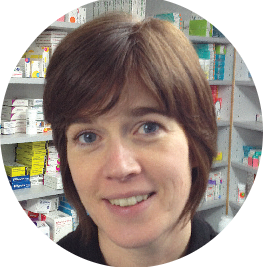Keeping healthy over age 65
In Insight
Follow this topic
Bookmark
Record learning outcomes
Community pharmacy could play an even greater role in maintaining the health of older people

According to the Office for National Statistics, there were 11 million people aged 65 and over in the UK in mid-2013. The over-65s need to be able to maintain their quality of life as they get older. Falls prevention, medicines reviews, home safety, keeping warm and staying well in the winter are all high on the NHS agenda.
Around 40 per cent of people aged 65 or over in the UK have a chronic health condition, so it's not surprising that older people tend to be regular visitors to their local pharmacy. But while customers in this age group often come in for prescription medicines and pharmacy services, they may need to be encouraged to purchase over-the-counter products. Sultan 'Sid' Dajani, community pharmacist and Royal Pharmaceutical Society board member, says that the biggest change to older people's health would be a nationally commissioned common ailments scheme.
'If this scheme was in place, more older people may come through the pharmacy door to buy products, not just bring in prescriptions,' he says. 'At the moment, if they need any medicines (eg painkillers), they go to their GP, as these are free on prescription.'
'But if they could get these free through a pharmacy instead, they may bypass their GP. This would be particularly important for vulnerable older customers, as it will increase their immediate access to medication (without waiting for a GP appointment) and may in the long term reduce their risk of falls.'
Mobility advice
According to Grant Abrahams, head of Betterlife from LloydsPharmacy, pharmacists need to raise awareness that there are various products and services that can help older people live more independently. 'Through LloydsPharmacy's recently launched How Are You Today? campaign, we hope that pharmacy will be able to play more of a part in helping with health niggles,' he says. 'The campaign highlights the invaluable role that pharmacists can play in talking to their customers and understanding their needs, to help identify which products may help them to live a more independent life.'
LloydsPharmacy opened its second Betterlife store (in Wells Green, Birmingham) in March, and hopes to open more Betterlife stores later this year. Customers can try products in a realistic living environment within kitchen, bedroom, living and bathroom room sets €“ and even test-drive a mobility scooter on a purpose-built track. The new store is next to the existing LloydsPharmacy branch, meaning that customers will have the opportunity to discuss their mobility and personal healthcare needs with a LloydsPharmacy expert in one visit, all under one roof.
Health awareness
The NHS Bowel Cancer Screening Programme invites all men and women aged 60 to 74 to carry out a facial occult blood (FOB) test at home every two years. But many bowel cancer screening tests are not returned for analysis. Mode Health, part of Mode Diagnostics Ltd €“ a company formed with technology developed at the University of Glasgow €“ has launched the UK's first ever digital home testing kit for the early stages of bowel cancer.
The company is very supportive of the NHS screening programme, but says that the Measure Bowel Health Test (which checks for faecal occult blood), available in selected Boots branches, is a discreet home test. Mode is planning to introduce in-store materials that will both attract and inform potential buyers, including a consumer leaflet and poster for the consultation room and window. 'Anyone purchasing Measure will need reassurance on the outcome,' says Dr Osian Meredith at Mode Health.
'An amber light indicates there is blood present, but it may not necessarily mean they have bowel cancer. They should, however, go to their GP who'll decide on any appropriate next steps. We do have a customer helpline for anyone concerned and will be providing POS materials which will include pertinent information about Measure and why it's important to detect bowel health issues early.'
Fighting fit
Around one in three adults over 65 who lives at home will have at least one fall a year. Mr Dajani says that pharmacists can help to improve older customers' overall health and therefore reduce the risk of falls by suggesting energy-boosting supplements (eg Metatone or Pharmaton) and healthy-living aids, such as walking sticks. If customers suffer from joint pain, they may benefit from products such as Deep Heat and Flexiseq, a drug-free gel for osteoarthritis sufferers.
'Many people are continuing to exercise and play sport into their 80s and beyond,' says Elvy Mardjono, senior product manager for Deep Relief Pain Relief Gel. 'Even more enjoy walking the dog, gardening or spending time on crafts and hobbies. When customers want something to ease pain, pharmacy staff have a chance to discuss a range of pain-relieving options and highlight the benefits of topical analgesics for suitable customers.'
Age-related sarcopenia can lead to muscle weakness, a loss of mobility and an increased risk of fractures and falls. 'Sarcopenia typically accelerates as people age, so it's important to focus on nutrients that can support muscle power and functioning,' says Rasmus Henriksen, national sales manager at Pharma Nord UK.
'Coenzyme Q10 is required by every cell in our bodies, including those in the muscles and heart, as part of their energy mechanism. Q10 is notoriously difficult to absorb in supplement form. If pharmacists want to recommend a Q10 supplement, make sure there are published trials showing its bioavailability. An August promotion will see a special Bio-Quinone Active Q10 GOLD 100 mg pack size introduced (60+30 free capsules),' he says.
Bladder weakness
According to Age UK, there are around 3.2 million women and men over 65 suffering from urinary incontinence in the UK. Pharmacies offer a range of bladder weakness products, including night-time protection products and the TENA Bed mattress cover. New TENA Men Protective Shield is the perfect entry product for men who haven't used purpose-made protection before.
'With bladder weakness being an especially prevalent occurrence for customers over 65, it's important that pharmacy staff are confident in approaching sensitive subjects like this,' says Donna Wilson, TENA Training and Brand Manager. 'Feelings of embarrassment and discomfort can prevent men and women from seeking help and advice, which could prove even more difficult for older customers who feel they don't have anyone to talk to about their health concerns.
'Advise them about the range of protective products that best suits their needs and how to use them, showing samples of the products. Pharmacists should also be aware that customers looking for bladder weakness products might be buying on behalf of an elderly family member or patient, and it's important for them to know the correct size and level of absorbency needed for the recipient, as well as whether they are able to put the product on unaided.'
Comment
 Fiona McElrea, Whithorn Pharmacy, Whithorn 'The mobility category is not that important for our pharmacy, although we do have a high amount of elderly people around us. We have looked at offering a full service in the past, but we couldn't justify it. We don't have the space or the footfall of that type of customer to warrant keeping a full range. There are a few things that we do stock, such as cup handles and urinal bottles €“ those sort of things €“ but we do also have the capacity to order from the wholesaler's catalogue if a patient wants something specific. Actually, the catalogue is massive and there are tons of things in it €“ so it's much easier for us to have that to hand and go through it with a patient or carer than just choose our own things to order.'
Fiona McElrea, Whithorn Pharmacy, Whithorn 'The mobility category is not that important for our pharmacy, although we do have a high amount of elderly people around us. We have looked at offering a full service in the past, but we couldn't justify it. We don't have the space or the footfall of that type of customer to warrant keeping a full range. There are a few things that we do stock, such as cup handles and urinal bottles €“ those sort of things €“ but we do also have the capacity to order from the wholesaler's catalogue if a patient wants something specific. Actually, the catalogue is massive and there are tons of things in it €“ so it's much easier for us to have that to hand and go through it with a patient or carer than just choose our own things to order.'
 Sultan 'Sid' Dajani, Wainwrights Chemist, Bishopstoke 'An ageing population will mean more age-related morbidity, so this is a growing market, and if it's not already deemed important, it soon will be! Customers ask us mainly about disability aids, independent living, weekly trays, repeat dispensing and prescribing, new medicines and OTC medicines. The most critical thing to get right in the category is having access to independent living aids, as you can't stock everything. Looking more widely, I do believe that social care and medical care should be working more closely together in older person care. Yet, at the moment, we have no signposting details to use in pharmacy, to help this to happen. I always think that it's certainly in all our interests to get this working well, because we'll all be there one day.'
Sultan 'Sid' Dajani, Wainwrights Chemist, Bishopstoke 'An ageing population will mean more age-related morbidity, so this is a growing market, and if it's not already deemed important, it soon will be! Customers ask us mainly about disability aids, independent living, weekly trays, repeat dispensing and prescribing, new medicines and OTC medicines. The most critical thing to get right in the category is having access to independent living aids, as you can't stock everything. Looking more widely, I do believe that social care and medical care should be working more closely together in older person care. Yet, at the moment, we have no signposting details to use in pharmacy, to help this to happen. I always think that it's certainly in all our interests to get this working well, because we'll all be there one day.'
 Ashley Cohen, Pharm-Assist (Healthcare), Leeds 'The mobility category is pretty limited in its importance for us, purely because we don't have the space for mobility items. I don't stock a huge amount in the category and so what we sell is quite small. What we've started to do is to partner with some online companies that we can order through. Before that we found that people were coming in asking for things we didn't have, so instead of just turning them away we offer this service as a half-way house and that way at least they can get hold of the product they need. We'll either put them in touch with the company or order on their behalf at cost. But it's ad-hoc and we don't advertise it.'
Ashley Cohen, Pharm-Assist (Healthcare), Leeds 'The mobility category is pretty limited in its importance for us, purely because we don't have the space for mobility items. I don't stock a huge amount in the category and so what we sell is quite small. What we've started to do is to partner with some online companies that we can order through. Before that we found that people were coming in asking for things we didn't have, so instead of just turning them away we offer this service as a half-way house and that way at least they can get hold of the product they need. We'll either put them in touch with the company or order on their behalf at cost. But it's ad-hoc and we don't advertise it.'
